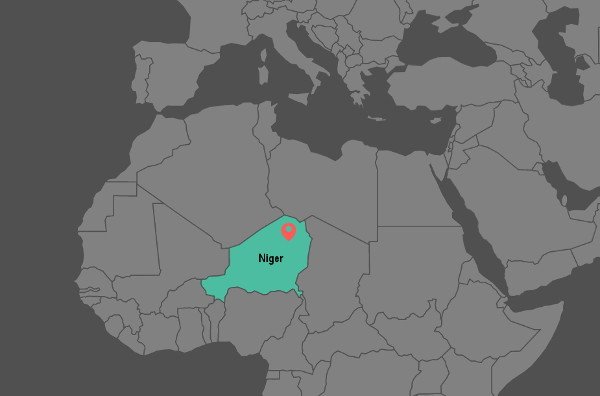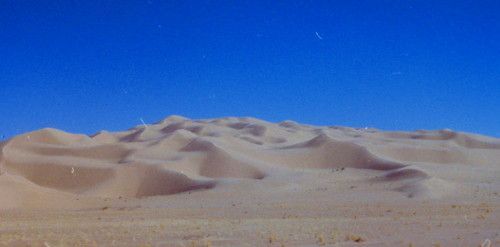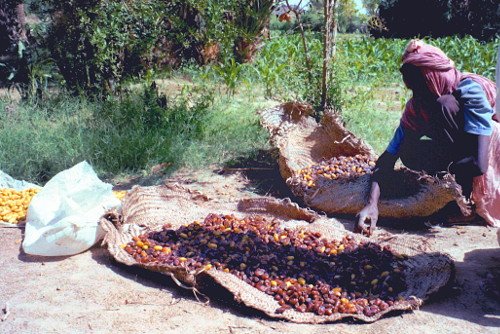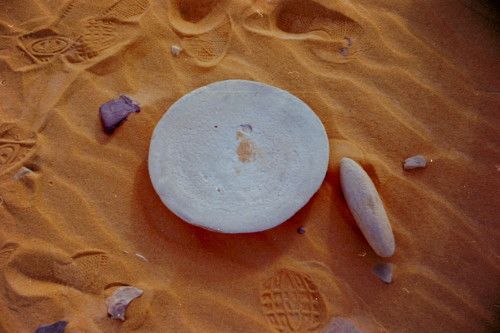Encounters with Africa: The Tuaregs of Agadez, by @terresco (translated from French)
This is an authorized translation in English of a post in French by @terresco: Rencontres avec l'Afrique - Les Touareg d'Agadez
As my primary language is not English, there are probably some mistakes in my translation.
Remember that the person who speaks here is NOT me, Vincent Celier (@vcelier), but @terresco, a French guy.

Niger
It was in Agadez, in northern Niger. The Sahara. We had left Abidjan on motorbikes and had the idea of crossing the Ténéré desert to go to Libya from the south and then reach Europe. For two days we were stranded in Agadez waiting for authorization. The period was tense, the Paris Dakar had canceled its crossing of the Ténéré for security reasons, the economy was affected.

The shadow was rare and sought after at this time. A small, thin, almost skinny gentleman sat by my side. As dusty and tired as me: life is hard in the desert. Deprived of their attributes, the Tuaregs are people like others: please, forget the legend of the warrior on his camel, with his washed blue turban and his sparkling sword.
Like all the Tuaregs of Agadez, he introduced himself as a friend of Mano Dayak. For spending time in Mali between Timbuktu and Gao the year before, I was interested in the Tuareg problem. Mano Dayak became a leader in the '80s and then a legend in the' 90s with the rebellion and his death.
It took time, but I had plenty of it this afternoon: Michel told me his life in several snippets. Put back in chronological order, I let him talk:
"I was born in the Aïr mountains, north of Agadez, on the edge of the Ténéré desert around 1950. From my youth in the village I remember my father who taught me the forgotten tracks, the stories of the past , traces of white antelopes in the dunes, sacred mountains and caravans of salt. Stories that are passed from generation to generation, during the evening around the fire, what you, the French, call the oral tradition. Like the majority of his friends, my father had only one wife, my mother. She watched over the hearth with the tenderness of a mother hen and the ferocity of a lioness. Never a passing traveler was short of water or dates in exchange for news of the trail. We called our region the Aïr gardens, we were rich ... we had water.

I was a Targui, singular of the word Tuareg, but between us we were called Kel Aïr, the people of Aïr. We were proud of this feeling of belonging. We were also Kel Tamasheq, people who speak Tamasheq, the common language of the Tuaregs. Our alphabet is original, the Tifinagh, found on some rock sites proving the millennial presence of my people in this territory.
I was about ten years old when my father explained to me that times were going to change. The colonizers were leaving but our people would be divided between several countries. We, those of Aïr, we would be from Niger, most of our cousins would be in Mali, others in Algeria, in Libya, in Upper Volta (which later became Burkina Faso). To be Malian or Nigerien did not speak to us so much, we were Tuaregs, we lived free on our territory.
In the following years, there were stories of Tuareg massacres by Djerma in neighboring Mali. The Tuaregs had to take refuge in Algeria or Libya. We avoided going to town but in our mountains everything was fine, protected from the outside world. What was changing were the travelers, passing through our mountains, they were on the run and armed. Instinctively we knew we had to help them. Frozen in my unconsciousness, my life followed its course.
In the early 70's, driven by drought that had decimated our herds, my father went looking for a better place to live. He disappeared, we never heard from him again. I looked for him for a long time when I had the means, in the 80s, without success. Would he have yielded to the sirens of violence? Or carried away in spite of himself in some fight, will he have been killed in a skirmish? That's what I want to believe.

Working conditions were harsh in Arlit. I had been posted in an underground mine. We went down in the morning ant went up at night. We never saw the light of day, we, accustomed to the infinite landscapes of the Ténéré and the burning sun of the desert. Even worse was the sound of drilling, it was unbearable. Rumors circulated about the danger of uranium, we knew nothing, we worked without breathing protection, without gloves, sometimes with our own clothes. The time was long at the bottom of the mine. I avoided going out on my weekly day off so as not to spend my salary.
Over time I was able to save a bit, go back to Agadez and find my future wife. The Tuaregs have a lot of respect for our women, although some of us are polygamous. We had a little party, we were already "old" for a wedding. Then we went to Aïr.
I had not seen my mother for almost 10 years; I was thinking that I will throw a party to introduce the mother of my future children, to bring her gifts, she who had suffered so much for us. I found her on her deathbed, as if she was waiting for me, just in time to get up to date. After the burial we tried to settle down but the drought in the early 80s was terrible and ruined all our efforts. Economy exhausted, it was necessary to leave again.
Where to go ... ?
It is clear that it is slower and more tiring to remember and write than to listen to a story at the foot of a very high mosque. The adventures, or at least the life, of Michel does not stop there but my memory requires a little rest before continuing.

-- @terresco
Encounters with Africa: Ivory Coast, by @terresco
Encounters with Africa: Abidjan, a daily pleasure, by @terresco
From Cape Town to Mombasa series:
Africa, the long crossing
From Cape Town to Mombasa: South Africa
From Cape Town to Mombasa: Namibia
From Cape Town to Mombasa: Botswana
From Cape Town to Mombasa: Zimbabwe
From Cape Town to Mombasa: Zimbabwe, part 2, by @terresco
From Cape Town to Mombasa: Zimbabwe, part 3, by @terresco
From Cape Town to Mombasa: Zambia, by @terresco
From Cape Town to Mombasa: Malawi, by @terresco
From Cape Town to Mombasa: Tanzania #1, by @terresco
From Cape Town to Mombasa: Tanzania #2, by @terresco
From Cape Town to Mombasa: Tanzania #3, by @terresco
From Cape Town to Mombasa: Tanzania #4, by @terresco
From Cape Town to Mombasa: Kenya, by @terresco
a very inspiring journey to stay respect with the meaning of travel @vcelier
Ohh its really amazing post @vcelier 👌 according to me your most of the post are awesome👍😍
So sad to listen this @terresco and happy to see your struggle for your mother and family and monetized and develop your family in better way....Good bless and happy in your life
That was fun to read. I can imagine how life in Africa is. I think it's always sunny in there.
Many adventures. Difficulties and anguish. Rich life. Reasonable existence.
i listen about this place ,any way a trip with friend has a worth ,in that hot season it is wounderfull to visit there ,area that contain your childhood memories has very meaning full to you .stay blessed and travel ...all the best
Thank you @vcelier for this story. I crossed Eastern & Southern Africa mainly up and down, and North Africa is still in my schedule. I can not even imagine Sahara desert without such local people like Tuaregs... or Berbers as well. They're deeply related to this land of so harsh conditions for any beings. Hopefully we may hope for to meet them always in their motherland as before.
Nice picture! 👍

You got an upvote, so it would be kind to follow this account for more upvotes in the future 👊🏼
Click the flag to downvote this @tomole444 comment and I will upvote your last unpaid post!
For the whole story see this post as well as this post.
Upvote this comment to support @duplibot and help reduce spam and superfluous comments.